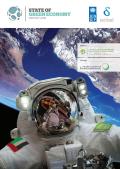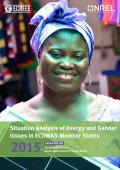
'The State of Green Economy Report 2016: Innovation on its Mind, and in its Pages' is a review and critical reflection of the findings of the World Green Economy Summit, held annually in October in Dubai. The report was developed by the Dubai Carbon Centre of Excellence (Dubai Carbon), Dubai Electricity and Water Authority (DEWA), the Dubai Supreme Council of Energy (DSCE) and in partnership with the United Nations Development Programme (UNDP).
The publication indexes green economic development, meanwhile, offering a platform for national and international experts, and thought leaders to share findings of research and development, solutions, tools, as well as replicable initiatives and case studies.
A contribution from the GGKP's Head, Benjamin Simmons, on 'Enabling Action with Green Growth Knowledge" can be found on pages 238-241 of the report.
This working paper provides a first overview of Central Kalimantan’s oil palm value chain and the business actors involved throughout. It aims to identify how business investment can be optimized to support socially inclusive development, delivering productivity, profitability, and sustainability gains.
As various countries explore the merits of green growth in their policies and programs, the Republic of Korea’s (ROK) transition toward green growth serves as an exemplary model.
This report examines why and how the ROK has pursued green growth as a national priority and as a development paradigm, sharing major milestones achieved in various areas such as greenhouse gas emissions, green technology, resource efficiency, and energy security. Drawing on the expertise of sector specialists and practitioners, the report highlights the processes, outcomes, and key takeaways in advancing green growth planning and implementation in the Korean context to address fossil fuel dependency, economic slowdown, and climate change. It highlights how a confluence of milestones created a strong enabling environment for green growth in the ROK, laying out the institutional, legal, and programmatic platform for green growth.

This report contains a fairly comprehensive analysis of the current situation of energy and gender issues in ECOWAS Member States. It outlines the fact that women continue to be excluded from the decision-making process concerning energy policy and also that their human rights continue to be compromised.
The aim of this report is to inform the development of the ECOWAS Policy for Gender Mainstreaming in Energy, which will support national governments in focusing and harmonizing their current efforts at gender mainstreaming, learning from one another, and collectively mobilizing support to achieve the SDGs and the objectives of the Sustainable Energy for All initiative.
Ethiopia has embarked on a national strategy of building a climate-resilient green economy. This model therefore does not focus only on mitigation strategies, but it also valorises the importance of improving climate-resilience, described as the ability to anticipate and adjust to climate change risks. In particular, the need to transit to a green economy model that is more inclusive is receiving growing attention as a pathway that can lead to sustainable development.
This report explores the linkages and contribution of inclusive green economy policies and strategies to structural transformation in Ethiopia. In this regard, the report provides an assessment of how inclusive green economy-related policies can reinforce the structural transformation agenda of Ethiopia; and how structural transformation policies and strategies can enhance the development of an inclusive green economy. The intent is to enhance understanding and promote the adoption of inclusive green economy policies that will contribute to achieving the structural transformation goals of Ethiopia.
